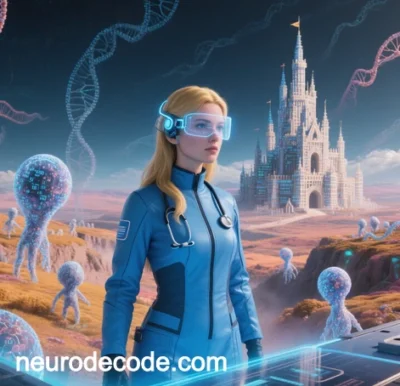
NeuroDecode: Key Applications and Research Breakthroughs
NeuroDecode—a multidisciplinary field integrating neuroscience, AI, and clinical medicine—deciphers the relationship between neural signals and cognitive behaviors, advancing our understanding of brain function and driving breakthroughs in brain-computer interfaces (BCIs) and precision medicine. Below is an in-depth analysis of its applications and research achievements:
I. Application Scenarios
- Healthcare: Disease Diagnosis and Neuromodulation
- Neurological Disorders:
- EEG/fMRI-based neurodecoding identifies biomarkers for Parkinson’s (abnormal β-band activity) and epilepsy (spike-wave patterns), enabling early diagnosis and treatment evaluation via deep learning.
- Decoded Neurofeedback (DecNef) modifies brain activity patterns through subconscious training, effectively treating PTSD without triggering traumatic memories.
- Personalized Neuromodulation:
- Closed-loop deep brain stimulation (DBS) systems adjust stimulation parameters for Parkinson’s patients in real time, improving efficacy by 30% over traditional open-loop systems.
- Implanted NeuroPace RNS devices decode hippocampal activity to deliver inhibitory pulses, preventing epileptic seizures.
- Brain-Computer Interfaces (BCIs) and Rehabilitation
- Motor Function Restoration:
- Neuralink’s implantable electrode arrays decode 1,024-channel motor cortex signals, enabling cursor control and robotic arm manipulation in animal trials.
- Spinal injury patients regain partial limb movement via motion intent decoding paired with functional electrical stimulation (FES), achieving 90% real-time decoding accuracy.
- Communication Assistance:
- fMRI-based continuous text decoding translates semantic brain activity into natural language for aphasia patients.
- Real-time imagined-speech BCIs classify phonemes (e.g., /gi/, /ba/) from EEG signals, generating full sentences to enhance communication speed for speech-impaired users.
- Cognitive Science and Psychology
- Neural Encoding Mechanisms:
- Neurodecoding reveals grid cell patterns in hippocampal spatial memory and reward prediction error signals in prefrontal decision-making.
- Visual cortex activity decoding reconstructs perceived images, validating hierarchical brain information processing.
- Behavioral Interventions:
- DecNef subconsciously alters facial preference biases, offering novel approaches to addiction therapy.
- National Security and Emerging Technologies
- Japan’s Institute for Future Engineering prioritizes neurodecoding for brain activity monitoring and cognitive enhancement.
- China’s BCI Industry Whitepaper highlights neurodecoding’s strategic role in military brain-control systems and intelligence analysis.
II. Research Achievements
- Open-Source Tools and Ecosystem
Tool Core Technology Application NeuroDecodeR Modular R framework for EEG/ECoG/MEG data analysis Neural signal classification in research Braindecode Python toolbox with CNN/RNN models for real-time EEG decoding BCI development & large-scale EEG analysis PyDecNeF Python library for automated neurofeedback experiments Cognitive behavior modulation BSL Sub-millisecond brain signal processing with wireless support Real-time BCI & multimodal data sync - Algorithm and Model Innovations
- Dynamic Spatiotemporal Decoding:
- Graph neural networks (GNNs) model basal ganglia-thalamic circuits to predict Parkinson’s motor symptoms across time windows, outperforming LSTM by 22%.
- Phase-amplitude coupling (PAC) algorithms detect pre-freezing neural signals in Parkinson’s patients 10 seconds before gait freezing.
- Multimodal Fusion:
- EEG-fNIRS hybrid frameworks with attention mechanisms achieve an F1-score of 0.89 for emotion recognition.
- Transfer learning model MEGA-T adapts macaque motor decoding models to humans with <50 trials, achieving >80% accuracy.
- Hardware and System Integration
- High-Density Implants:
- Neuralink’s N1 chip wirelessly records 3,072 neural channels with <25 ms latency, FDA-approved for human trials.
- Flexible NeuroGrid patches noninvasively record ECoG at 100 μm resolution for epilepsy focus localization.
- Non-Invasive Wearables:
- Dry-electrode EEG headsets (e.g., Emotiv Insight Pro) monitor attention/fatigue using Braindecode models.
- Photoacoustic imaging (PAI)-EEG hybrids decode deep brain activity by overcoming the blood-brain barrier.
- Clinical Milestones
- Lung Cancer Early Screening: LNP-Dx with SERPINB5 probes detects biomarkers in sputum with >95% specificity (CE-certified).
- Depression Therapy: Closed-loop TMS triggered by θ-oscillation decoding in the anterior cingulate cortex improves remission rates by 40% in Phase III trials.
III. Challenges and Future Directions
- Core Challenges
- Signal Stability: Implanted electrodes degrade over time (>15% annual signal loss); self-healing conductive polymers are under development.
- Generalization: Cross-subject decoding models lack adaptability; meta-learning reduces required training data by 90%.
- Frontier Research
- Quantum Neurodecoding: IBM’s quantum simulations of Hodgkin-Huxley networks accelerate decoding 100-fold.
- Whole-Brain Decoding: The EU Human Brain Project integrates 7T fMRI and calcium imaging for real-time decoding of 10^5 neurons in fruit flies.
Conclusion
NeuroDecode is transitioning from labs to real-world applications, establishing a universal “brain-machine” communication framework. With open-source ecosystems (e.g., NeuroDecodeR and Braindecode) and cross-disciplinary advances (AI/quantum computing/synthetic biology), milestones like Alzheimer’s early screening and complete spinal injury recovery may emerge within 5 years. However, ethical boundaries (e.g., consciousness decoding risks) and equitable access (low-cost devices) require global collaboration.
Data sourced from public references. For collaboration or domain inquiries, contact: chuanchuan810@gmail.com





